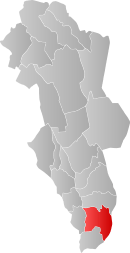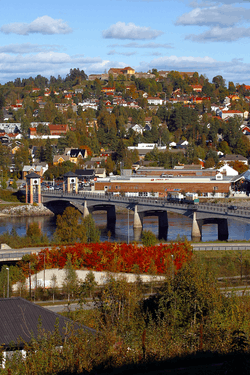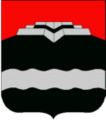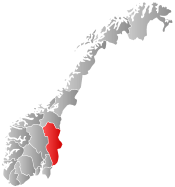Kongsvinger
| Kongsvinger kommune | |||
|---|---|---|---|
| Municipality | |||
|
Kongsvinger in early-September 2009 | |||
| |||
 Kongsvinger within Hedmark | |||
| Coordinates: 60°14′35″N 12°13′32″E / 60.24306°N 12.22556°ECoordinates: 60°14′35″N 12°13′32″E / 60.24306°N 12.22556°E | |||
| Country | Norway | ||
| County | Hedmark | ||
| District | Glåmdal | ||
| Administrative centre | Kongsvinger | ||
| Government | |||
| • Mayor (2015) | Sjur Strand (Ap) | ||
| Area | |||
| • Total | 1,036 km2 (400 sq mi) | ||
| • Land | 953 km2 (368 sq mi) | ||
| Area rank | 102 in Norway | ||
| Population (2015) | |||
| • Total | 17,885 | ||
| • Rank | 57 in Norway | ||
| • Density | 18/km2 (50/sq mi) | ||
| • Change (10 years) | 0.6 % | ||
| Time zone | CET (UTC+1) | ||
| • Summer (DST) | CEST (UTC+2) | ||
| ISO 3166 code | NO-0402 | ||
| Official language form | Bokmål | ||
| Website |
www | ||
|
| |||
![]() Kongsvinger is a town and is a municipality in Hedmark county, Norway. It is part of the traditional region of Glåmdal. The administrative centre of the municipality is the town of Kongsvinger.
Kongsvinger is a town and is a municipality in Hedmark county, Norway. It is part of the traditional region of Glåmdal. The administrative centre of the municipality is the town of Kongsvinger.
A patch of land on both sides of the river Glomma with an area of approximately 5.2 square kilometres (2 sq mi) was separated from Vinger as a town named Kongsvinger by Royal Charter in 1854. The municipalities of Vinger and Brandval were merged with Kongsvinger on 1 January 1964. The new municipality of Kongsvinger briefly lost its status as a town after this amalgamation, but was later reinstated with its town status.
General information
Name
The first element Kongs- ("the King's") was added after the fortress was built in 1690. It was first applied only to the fortress (written as Königs Winger in old documents), then to the city that grew up around it and finally the modern municipality. The second element Vinger (Old Norse: Vingr) is an old district name which is still in use.
Coat-of-arms
The coat-of-arms is from relatively modern times. They were granted on 25 June 1926. The arms show the Kongsvinger Fortress with the white line representing the Glomma river. The fortress is of historical importance to the area.[1]
Ethnic and foreign minority
| Ancestry | Number |
|---|---|
| | 195 |
| | 181 |
| | 166 |
| | 142 |
| | 139 |
| | 130 |
| | 129 |
| | 89 |
History
Kongsvinger already existed as a trading center by the Middle Ages, due to the accessibility by natural waterways. Viking chieftains reached Sweden by boat from Kongsvinger. Kongsvinger fortress was founded in 1669, and a star-shaped plan was laid out for the fortress. Work began in 1682 and it was finished in 1690 as part of a general upgrade to Norwegian fortresses.[3] The building of the fortress formed the foundations for what was to become the town of Kongsvinger. The fortress was built as a defensive structure against the Swedes, and on numerous occasions there have been military engagements in the area around the fortress, but Kongsvinger fortress has never been taken in military combat. Below Kongsvinger fortress lies Øvrebyen, which literally translated means Uppertown. This is the oldest part of the town of Kongsvinger, and one can still find a number of the original houses built after the establishment of the fortress. Kongsvinger Museum is located here, together with a museum of female emancipation in a building called "Rolighed", the home of Dagny Juel, the famous author once portrayed by Edvard Munch. Øvrebyen was designated as an area of special antiquarial interest in 1973. Today, Øvrebyen, the old uptown area around the fortress is dominated by wooden buildings from the 18th and 19th centuries, laid out in the typical right angle square plan - by architect Cicignon - popular in this period.
The eastern parts of Kongsvinger and its neighboring municipalities to the north and south were populated at the end of the 17th century by Finnish emigrants who came across the Swedish border. The area is called Finnskogen, "The Finnish forest".
Kongsvinger played an important part in the Norwegian resistance force against the Nazis being a gateway to Sweden. Norway's highest decorated citizen, Gunnar Sønsteby frequently passed through Kongsvinger in his work to sabotage the Nazis' installations in Norway. Some of the busiest escape routes for refugees also went through Kongsvinger to Sweden.
In 1964, Kongsvinger and the surrounding municipalities of Vinger and Brandval were united into the present Kongsvinger Municipality. Kongsvinger has city status (from 1854), and is thereby both city and township, governed by a town council under a mayor, elected by popular vote. There are also appointed executive officials, such as town commissioner or town director (rådmann), who is chief executive of the municipality, and its 700 plus workforce. There are 1,530 businesses including forestry and farming, and 245 of these are retail outlets. There are 25,000 square metres (269,098 sq ft) of mall situated in the downtown area. As well as downtown shopping streets, there are also glass domed pedestrian shopping streets. The governmental regional hospital is also situated in Kongsvinger.
From 1983 to 1999, and again in 2010, Kongsvinger's soccer team KIL Toppfotball held a position in the Norwegian Premier League. It made some notable merits participating in the UEFA Cup and winning a silver medal during the 1992 season.
Geography
Kongsvinger is situated on both sides of the river Glomma, where the south-flowing river takes a sharp northwestward turn. The Kongsvinger Fortress is the main landmark, situated on a hill west and north of the river. Kongsvinger is a regional center of the Glåmdal region, which is made up of the southern parts of Hedmark county. It is bordered to the west by the municipality of Sør-Odal, to the north by Grue, and to the south by Eidskog. To the east it borders to Sweden. Kongsvinger is about 110 kilometres (68 mi) from Oslo and 70 kilometres (43 mi) from Oslo Airport, Gardermoen.
Town
The downtown area of Kongsvinger is currently being refurbished with a new public library being built, and the town square being given a face lift. There are also plans for a new hotel to be built in conjunction to the refurbishment of the down town area as well as for the construction of two new shopping centres. These plans are part of the overall strategy of the city council to make Kongsvinger more attractive to tourists and potential new residents.
Subdivisions
- Digerudlia
- Gjemselund
- Glåmlia
- Hexumløkka
- Holt
- Kurudlia
- Langeland
- Langerudberget
- Midtbyen
- Rasta
- Skriverskogen
- Stasjonssida
- Tråstad
- Vangen
- Vennersberg
- Øvrebyen
Infrastructure
- Several daily train services to Oslo
- Twice daily train services to Stockholm, Sweden
- Five daily train services to Karlstad, Sweden
- Hourly bus services to Oslo and Oslo Airport, Gardermoen
- Several daily bus services to Elverum, Hamar, and Charlottenberg, Sweden
- Suburban bus services running throughout the city of Kongsvinger
- Four lane highway between Kongsvinger and Oslo is under construction.
- Holtbergmasta, a 163 metres tall guyed mast for FM-/TV-broadcasting on Holtberget at 60.167602 N 11.994356 E, which was built in 1967.
Distances
The following are distances to Kongsvinger from various locations:
| Starting location | Distance to Kongsvinger |
|---|---|
| Oslo | 94 km (58 mi) |
| Oslo Airport, Gardermoen | 74 km (46 mi) |
| Hamar | 100 km (62 mi) |
| Elverum | 95 km (59 mi) |
| Trondheim | 450 km (280 mi) |
| Bergen | 545 km (339 mi) |
| Tromsø | 1,600 km (990 mi) |
| Charlottenberg (Sweden) | 44 km (27 mi) |
| Arvika (Sweden) | 79 km (49 mi) |
| Karlstad (Sweden) | 150 km (93 mi) |
| Stockholm (Sweden) | 455 km (283 mi) |
Economy
Major businesses
- InfoCare Computer service and logistics
- Eidsiva Energi customer service unit (energy)
- Ibas (IT)
- Thales (IT)
- Metso Minerals (conveyor belts)
- Schütz Nordic (plastic)
- Statistics Norway
- Telenor customer service unit (telecommunications)
- TI Automotive (fuel systems)
Education
| In the city of Kongsvinger: | Elsewhere in the municipality |
|---|---|
|
|
Notable residents
- Christina Waage (b. 1995), Miss Norway 2016
- Håvard Gimse (b. 1966), pianist
- Levi Henriksen (b. 1964), author
- Dagny Juel (1867–1901), poet
- Monica Kristensen Solås (b. 1950), polar explorer
- Roy Lønhøiden (b. 1964), composer and performing artist
- Åse Wisløff Nilssen (b. 1945), politician
- Even Pellerud (b. 1953), soccer player and coach
- Bjørge Stensbøl (b. 1947), former chief of top-level athletics Olympiatoppen
- Tove Strand (b. 1946), politician
- Sverre Strandli (1925–1985), hammer thrower
- Erik Werenskiold (1855–1938), painter and illustrator
- Eva Lund Haugen (1907–1996), Norwegian-American author
- Yohanna (b. 1990), Icelandic singer at the Eurovision Song Contest 2009
- Mullah Krekar (b. 1956), Kurdish Sunni Islam scholar
International relations
Twin towns — Sister cities
The following cities are twinned with Kongsvinger:[6]
-
 Arvika, Värmland County, Sweden
Arvika, Värmland County, Sweden -
 Ebel es Saqi, Marjayoun, Lebanon
Ebel es Saqi, Marjayoun, Lebanon -
 Skive, Region Midtjylland, Denmark
Skive, Region Midtjylland, Denmark -
 Ylöjärvi, Länsi-Suomi, Finland
Ylöjärvi, Länsi-Suomi, Finland
In Popular Culture
Kongsvinger is referenced within the title (and indirectly within the lyrics) of the song "A Sentence Of Sorts In Kongsvinger" by the American rock band Of Montreal on the 2007 album Hissing Fauna, Are You the Destroyer?.
References
- ↑ Norske Kommunevåpen (1990). "Nye kommunevåbener i Norden". Retrieved 22 December 2008.
- ↑ "Immigrants and Norwegian-born to immigrant parents". ssb.no. Retrieved 29 June 2015.
- ↑ "Kongsvinger". GoNorway.com. Retrieved 9 June 2016.
- ↑ "Høgskolesenteret i Kongsvinger" (in Norwegian). Retrieved 9 June 2016.
- ↑ Anders Holm. "Øvrebyen Videregående Skole" (in Norwegian). Hedmark Fykleskommune. Retrieved 9 June 2016.
- ↑ "Vennskapsbyer". Kongsvinger kommune. Retrieved 22 December 2008. (Norwegian)
External links
 Media related to Kongsvinger at Wikimedia Commons
Media related to Kongsvinger at Wikimedia Commons The dictionary definition of Kongsvinger at Wiktionary
The dictionary definition of Kongsvinger at Wiktionary- Municipal fact sheet from Statistics Norway
- Byen vår (cultural organisation) (Norwegian)
- Glåmdalen local newspaper (Norwegian)
- Go Norway Norwegian Tourism - Kongsvinger (Norwegian)




